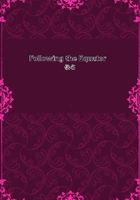
第272章
Several long journeys--gave us experience of the Cape Colony railways;easy-riding, fine cars; all the conveniences; thorough cleanliness;comfortable beds furnished for the night trains. It was in the first days of June, and winter; the daytime was pleasant, the nighttime nice and cold. Spinning along all day in the cars it was ecstasy to breathe the bracing air and gaze out over the vast brown solitudes of the velvet plains, soft and lovely near by, still softer and lovelier further away, softest and loveliest of all in the remote distances, where dim island-hills seemed afloat, as in a sea--a sea made of dream-stuff and flushed with colors faint and rich; and dear me, the depth of the sky, and the beauty of the strange new cloud-forms, and the glory of the sunshine, the lavishness, the wastefulness of it! The vigor and freshness and inspiration of the air and the sunwell, it was all just as Olive Schreiner had made it in her books.
To me the veldt, in its sober winter garb, was surpassingly beautiful.
There were unlevel stretches where it was rolling and swelling, and rising and subsiding, and sweeping superbly on and on, and still on and on like an ocean, toward the faraway horizon, its pale brown deepening by delicately graduated shades to rich orange, and finally to purple and crimson where it washed against the wooded hills and naked red crags at the base of the sky.
Everywhere, from Cape Town to Kimberley and from Kimberley to Port Elizabeth and East London, the towns were well populated with tamed blacks; tamed and Christianized too, I suppose, for they wore the dowdy clothes of our Christian civilization. But for that, many of them would have been remarkably handsome. These fiendish clothes, together with the proper lounging gait, good-natured face, happy air, and easy laugh, made them precise counterparts of our American blacks; often where all the other aspects were strikingly and harmoniously and thrillingly African, a flock of these natives would intrude, looking wholly out of place, and spoil it all, making the thing a grating discord, half African and half American.
One Sunday in King William's Town a score of colored women came mincing across the great barren square dressed--oh, in the last perfection of fashion, and newness, and expensiveness, and showy mixture of unrelated colors,--all just as I had seen it so often at home; and in their faces and their gait was that languishing, aristocratic, divine delight in their finery which was so familiar to me, and had always been such a satisfaction to my eye and my heart. I seemed among old, old friends;friends of fifty years, and I stopped and cordially greeted them. They broke into a good-fellowship laugh, flashing their white teeth upon me, and all answered at once. I did not understand a word they said. I was astonished; I was not dreaming that they would answer in anything but American.
The voices, too, of the African women, were familiar to me sweet and musical, just like those of the slave women of my early days. I followed a couple of them all over the Orange Free State--no, over its capital--Bloemfontein, to hear their liquid voices and the happy ripple of their laughter. Their language was a large improvement upon American. Also upon the Zulu. It had no Zulu clicks in it; and it seemed to have no angles or corners, no roughness, no vile s's or other hissing sounds, but was very, very mellow and rounded and flowing.
In moving about the country in the trains, I had opportunity to see a good many Boers of the veldt. One day at a village station a hundred of them got out of the third-class cars to feed.